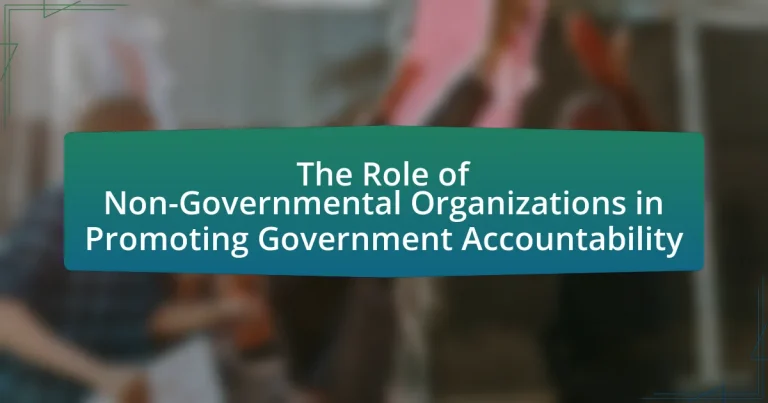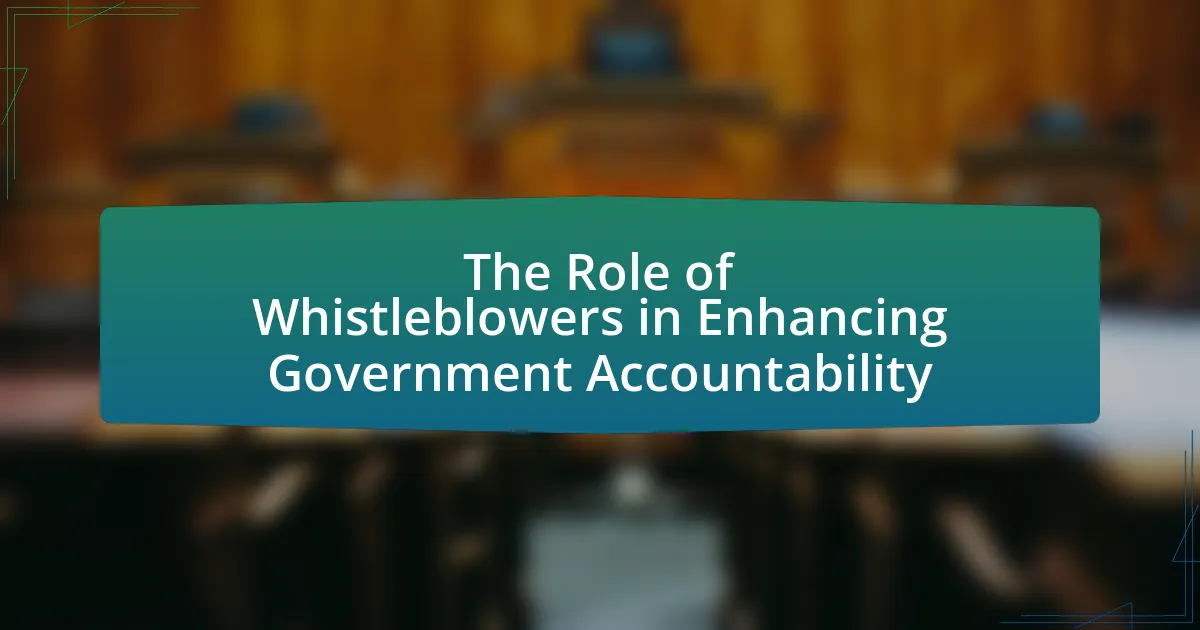Non-Governmental Organizations (NGOs) play a vital role in promoting government accountability by acting as watchdogs, advocating for transparency, and empowering citizens. They influence government actions through advocacy, lobbying, and public awareness campaigns, while employing mechanisms such as monitoring and reporting to hold officials accountable. The article explores the various types of NGOs involved in this process, the challenges they face, and the strategies they use to engage citizens and influence policy changes. It also highlights the importance of government accountability in fostering public trust and the consequences of its absence, providing a comprehensive overview of the significant impact NGOs have on governance.
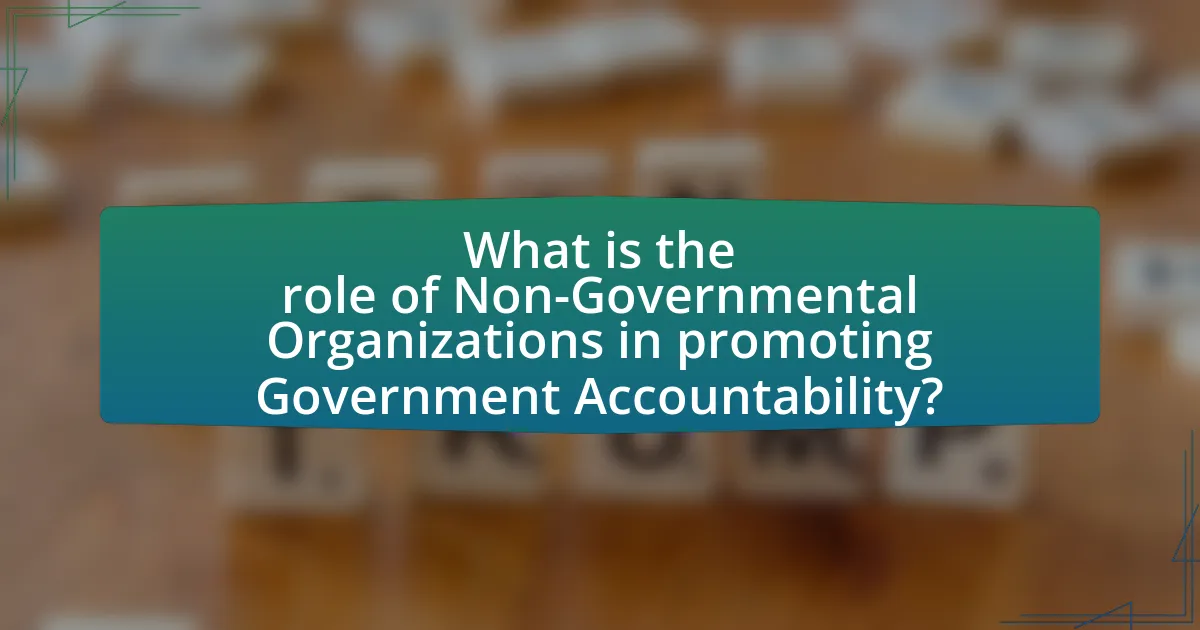
What is the role of Non-Governmental Organizations in promoting Government Accountability?
Non-Governmental Organizations (NGOs) play a crucial role in promoting government accountability by acting as watchdogs, advocating for transparency, and empowering citizens. NGOs monitor government actions, report on corruption, and provide platforms for public engagement, thereby holding officials accountable for their decisions. For instance, organizations like Transparency International publish the Corruption Perceptions Index, which highlights the levels of corruption in various countries, influencing public opinion and policy reforms. Additionally, NGOs often engage in legal advocacy, pushing for laws that enhance governmental transparency and accountability, such as the Freedom of Information Act in various nations. Through these activities, NGOs contribute significantly to fostering a culture of accountability within governments.
How do Non-Governmental Organizations influence government actions?
Non-Governmental Organizations (NGOs) influence government actions primarily through advocacy, lobbying, and public awareness campaigns. By mobilizing public opinion and providing expertise on specific issues, NGOs can pressure governments to adopt policies that align with their objectives. For instance, NGOs like Amnesty International and Human Rights Watch have successfully lobbied for changes in legislation regarding human rights protections, demonstrating their impact on governmental policy-making. Additionally, NGOs often engage in research and data collection, presenting evidence that supports their positions, which can lead to informed decision-making by government officials. This combination of advocacy, public engagement, and evidence-based recommendations illustrates how NGOs play a crucial role in shaping government actions and promoting accountability.
What mechanisms do NGOs use to hold governments accountable?
NGOs use various mechanisms to hold governments accountable, including advocacy, monitoring, and reporting. Advocacy involves lobbying for policy changes and raising public awareness about government actions, which can pressure officials to act responsibly. Monitoring entails tracking government compliance with laws and regulations, often through independent assessments and data collection. Reporting includes publishing findings and recommendations, which can inform the public and influence policymakers. For instance, organizations like Human Rights Watch and Amnesty International regularly publish reports that document human rights abuses, compelling governments to address these issues due to public scrutiny and international pressure.
How do NGOs engage with citizens to promote accountability?
NGOs engage with citizens to promote accountability through advocacy, education, and participatory initiatives. They conduct awareness campaigns to inform citizens about their rights and the importance of government accountability, often utilizing social media and community outreach to reach a broader audience. For instance, organizations like Transparency International mobilize citizens to report corruption and hold public officials accountable, demonstrating the effectiveness of citizen engagement in fostering transparency. Additionally, NGOs facilitate platforms for citizen feedback, such as town hall meetings and surveys, allowing citizens to voice concerns and influence policy decisions. This engagement not only empowers citizens but also creates a culture of accountability within government institutions.
Why is government accountability important?
Government accountability is important because it ensures that public officials are answerable for their actions and decisions, fostering transparency and trust in governance. When governments are held accountable, they are more likely to act in the best interests of citizens, leading to better public services and reduced corruption. Research indicates that countries with strong accountability mechanisms experience lower levels of corruption and higher levels of citizen satisfaction, as seen in the World Bank’s Governance Indicators, which show a correlation between accountability and effective governance.
What are the consequences of a lack of government accountability?
A lack of government accountability leads to widespread corruption and abuse of power. When government officials are not held accountable for their actions, they may engage in unethical practices, such as embezzlement or nepotism, undermining public trust. For instance, Transparency International’s Corruption Perceptions Index indicates that countries with low accountability often experience higher levels of corruption, which can result in poor public services and economic instability. Additionally, the absence of accountability can stifle civic engagement, as citizens may feel powerless to effect change, further entrenching a cycle of mismanagement and disenfranchisement.
How does accountability impact public trust in government?
Accountability significantly enhances public trust in government by ensuring that officials are answerable for their actions and decisions. When governments are transparent and held responsible for their conduct, citizens are more likely to perceive them as legitimate and trustworthy. Research indicates that countries with strong accountability mechanisms, such as independent audits and public reporting, experience higher levels of citizen trust. For instance, a study by the World Bank found that nations with effective accountability frameworks saw a 20% increase in public trust metrics compared to those lacking such systems. This correlation underscores the importance of accountability in fostering a positive relationship between the government and its citizens.
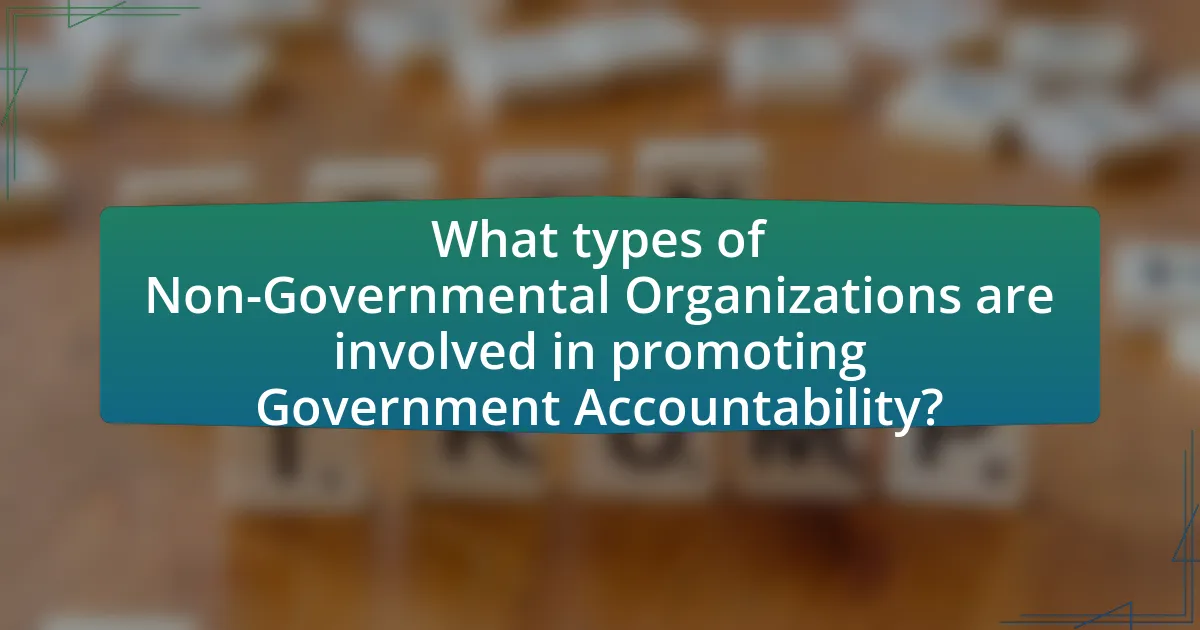
What types of Non-Governmental Organizations are involved in promoting Government Accountability?
Non-Governmental Organizations (NGOs) involved in promoting government accountability include advocacy groups, watchdog organizations, and civil society organizations. Advocacy groups, such as Transparency International, focus on raising awareness and influencing policy changes related to corruption and governance. Watchdog organizations, like the Open Government Partnership, monitor government actions and hold officials accountable through reporting and public engagement. Civil society organizations, including local grassroots groups, mobilize communities to demand transparency and accountability from their governments. These types of NGOs play a crucial role in fostering a culture of accountability by providing oversight, promoting civic engagement, and advocating for policy reforms.
What are the different categories of NGOs focused on accountability?
The different categories of NGOs focused on accountability include watchdog organizations, advocacy groups, service delivery NGOs, and research and policy institutes. Watchdog organizations monitor government actions and hold officials accountable through reporting and transparency initiatives. Advocacy groups work to influence policy and promote accountability through public campaigns and lobbying efforts. Service delivery NGOs ensure that government services meet community needs and standards, thereby holding governments accountable for their commitments. Research and policy institutes analyze government performance and provide evidence-based recommendations to improve accountability mechanisms. Each category plays a distinct role in enhancing government accountability through various strategies and approaches.
How do advocacy NGOs differ from service delivery NGOs?
Advocacy NGOs focus on influencing public policy and raising awareness about social issues, while service delivery NGOs provide direct services to communities, such as healthcare or education. Advocacy NGOs aim to change systems and policies through campaigns and lobbying efforts, often addressing root causes of issues, whereas service delivery NGOs concentrate on meeting immediate needs and improving quality of life through tangible programs. For example, organizations like Amnesty International engage in advocacy to promote human rights, while organizations like Doctors Without Borders deliver medical aid directly to those in need.
What roles do international NGOs play in local accountability efforts?
International NGOs play a crucial role in local accountability efforts by promoting transparency, empowering communities, and advocating for policy changes. They facilitate access to information, enabling citizens to hold local governments accountable for their actions. For instance, organizations like Transparency International provide tools and resources that help communities monitor government performance and corruption. Additionally, international NGOs often engage in capacity-building initiatives, training local activists and organizations to effectively demand accountability from their governments. This multifaceted approach not only enhances civic engagement but also fosters a culture of accountability within local governance structures.
How do grassroots organizations contribute to government accountability?
Grassroots organizations contribute to government accountability by mobilizing community members to advocate for transparency and hold officials accountable for their actions. These organizations often engage in activities such as monitoring government activities, organizing public forums, and disseminating information to educate citizens about their rights and governmental processes. For instance, studies have shown that grassroots movements can lead to increased voter participation and pressure on elected officials to respond to constituents’ needs, thereby enhancing democratic governance. Additionally, grassroots organizations frequently collaborate with other civil society groups to amplify their impact, as seen in various successful campaigns that have led to policy changes and greater governmental oversight.
What strategies do grassroots NGOs employ to mobilize communities?
Grassroots NGOs employ various strategies to mobilize communities, including community engagement, capacity building, and advocacy. Community engagement involves organizing local meetings and events to raise awareness about issues affecting the community, fostering a sense of ownership and participation. Capacity building focuses on empowering individuals through training and resources, enabling them to take action on local issues. Advocacy efforts aim to influence policy and decision-making by mobilizing community members to voice their concerns and demands to local authorities. For instance, the “Community Organizing Toolkit” by the National Network for Organizing (NNOR) highlights successful case studies where grassroots NGOs effectively mobilized communities to address local governance issues, demonstrating the impact of these strategies in promoting government accountability.
How effective are grassroots movements in influencing policy changes?
Grassroots movements are highly effective in influencing policy changes, as evidenced by numerous historical and contemporary examples. These movements mobilize community members to advocate for specific issues, often leading to significant legislative outcomes. For instance, the Civil Rights Movement in the United States successfully pushed for the Civil Rights Act of 1964 and the Voting Rights Act of 1965 through sustained grassroots activism. Additionally, the environmental movement has led to the establishment of policies such as the Clean Air Act and the Clean Water Act, demonstrating the power of organized citizen efforts. Research indicates that grassroots campaigns can shift public opinion and pressure policymakers, making them a crucial component in the landscape of political change.
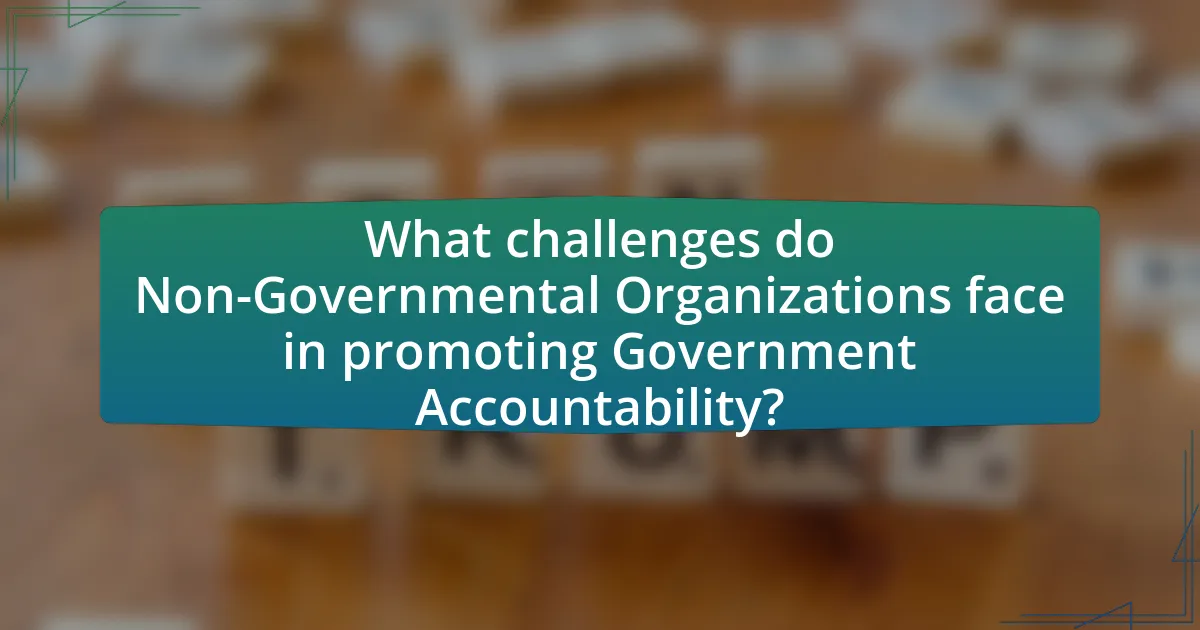
What challenges do Non-Governmental Organizations face in promoting Government Accountability?
Non-Governmental Organizations (NGOs) face significant challenges in promoting government accountability, primarily due to limited access to information, political resistance, and resource constraints. Limited access to information hinders NGOs’ ability to gather data necessary for holding governments accountable, as many governments restrict transparency. Political resistance manifests in the form of government pushback against NGO activities, including legal restrictions and harassment, which can undermine their effectiveness. Resource constraints, including funding limitations and staffing shortages, further impede NGOs’ capacity to conduct thorough oversight and advocacy efforts. These challenges collectively diminish the impact of NGOs in fostering accountability within governmental structures.
What obstacles hinder the effectiveness of NGOs in this role?
Obstacles that hinder the effectiveness of NGOs in promoting government accountability include limited funding, regulatory restrictions, and political interference. Limited funding restricts NGOs’ capacity to implement programs and reach communities effectively, as evidenced by a 2020 report from the Global Fund for Community Foundations, which highlighted that 70% of NGOs reported funding shortages impacting their operations. Regulatory restrictions, such as stringent registration processes and reporting requirements, can stifle NGO activities, as seen in countries like Egypt, where laws have been enacted to control NGO operations. Political interference can undermine NGO credibility and effectiveness, particularly in authoritarian regimes where governments may view NGOs as threats, leading to harassment or closure, as documented in the 2019 Freedom House report on civil society.
How do political environments affect NGO operations?
Political environments significantly influence NGO operations by determining the regulatory framework, funding availability, and public perception of NGOs. In authoritarian regimes, NGOs often face restrictive laws that limit their activities, such as stringent registration processes and censorship, which can hinder their ability to operate effectively. For instance, in countries like Russia, laws enacted in 2012 require NGOs receiving foreign funding to register as “foreign agents,” creating a hostile environment for advocacy and accountability efforts. Conversely, in democratic settings, NGOs typically enjoy greater freedom to operate, access to funding, and support from the public, which enhances their capacity to promote government accountability. Research by the World Bank indicates that NGOs in democratic countries are more likely to engage in policy advocacy and hold governments accountable due to a more favorable political climate.
What funding challenges do NGOs encounter in their accountability efforts?
NGOs encounter several funding challenges in their accountability efforts, primarily including reliance on inconsistent donor funding, limited access to diversified funding sources, and the pressure to meet donor expectations. Inconsistent donor funding can lead to financial instability, making it difficult for NGOs to maintain ongoing accountability initiatives. Limited access to diversified funding sources restricts NGOs’ ability to secure long-term financial support, often resulting in a focus on short-term projects rather than sustained accountability efforts. Additionally, the pressure to meet donor expectations can divert resources and attention away from accountability measures, as NGOs may prioritize projects that align with donor interests over those that genuinely enhance transparency and accountability. These challenges hinder the effectiveness of NGOs in promoting government accountability.
How do NGOs navigate legal and regulatory barriers?
NGOs navigate legal and regulatory barriers by employing strategic legal frameworks, advocacy, and collaboration with stakeholders. They often engage legal experts to understand and comply with local laws, ensuring their operations align with regulatory requirements. For instance, NGOs may utilize legal aid to challenge restrictive laws or advocate for policy reforms that promote a more enabling environment for civil society. Additionally, they build coalitions with other organizations to amplify their voice and influence policy changes. Research indicates that NGOs that actively participate in legal advocacy can significantly impact legislative processes, as seen in various countries where NGOs successfully lobbied for more favorable regulations.
What strategies can NGOs use to advocate for favorable policies?
NGOs can advocate for favorable policies through strategies such as grassroots mobilization, coalition building, and evidence-based lobbying. Grassroots mobilization involves engaging community members to raise awareness and demonstrate public support for specific issues, which can influence policymakers. Coalition building allows NGOs to unite with other organizations to amplify their voice and resources, increasing their impact on policy discussions. Evidence-based lobbying entails presenting data and research to policymakers to support their positions, which can lead to more informed decision-making. For instance, a study by the World Resources Institute highlights that NGOs effectively used data to influence environmental policy changes in various countries, demonstrating the power of evidence in advocacy efforts.
How can NGOs build coalitions to strengthen their impact?
NGOs can build coalitions to strengthen their impact by identifying common goals and aligning their missions with like-minded organizations. This collaborative approach allows NGOs to pool resources, share expertise, and amplify their advocacy efforts. For instance, the Global Partnership for Social Accountability, which includes various NGOs, demonstrates how collective action can lead to enhanced government accountability through shared strategies and unified messaging. By leveraging each organization’s strengths, coalitions can create a more significant influence on policy changes and public awareness, ultimately leading to improved governance outcomes.
What best practices can NGOs adopt to enhance their effectiveness?
NGOs can enhance their effectiveness by adopting a strategic approach that includes clear goal-setting, stakeholder engagement, and data-driven decision-making. Clear goal-setting allows NGOs to define specific, measurable objectives that align with their mission, ensuring focused efforts. Engaging stakeholders, including beneficiaries, local communities, and government entities, fosters collaboration and builds trust, which is essential for successful implementation of programs. Data-driven decision-making enables NGOs to assess their impact through metrics and evaluations, allowing for adjustments and improvements based on evidence. For instance, a study by the World Bank found that NGOs that utilize performance metrics are 30% more effective in achieving their objectives compared to those that do not.
How can NGOs measure their impact on government accountability?
NGOs can measure their impact on government accountability through various methods, including monitoring policy changes, assessing public engagement, and evaluating transparency initiatives. For instance, by tracking legislative amendments or the implementation of anti-corruption laws, NGOs can quantify their influence on governmental practices. Additionally, surveys and public opinion polls can gauge citizen awareness and engagement regarding government accountability, providing tangible metrics of change. Research by the World Bank indicates that increased civic engagement correlates with improved government accountability, reinforcing the effectiveness of NGO efforts in this area.
What role does transparency play in NGO operations?
Transparency is crucial in NGO operations as it fosters trust, accountability, and credibility among stakeholders. By openly sharing information about their activities, funding sources, and decision-making processes, NGOs can demonstrate their commitment to ethical practices and responsible governance. For instance, a study by the International NGO Accountability Charter found that organizations with high transparency levels are more likely to receive public support and funding, as stakeholders feel more confident in their operations. This transparency not only enhances the NGO’s reputation but also encourages greater community engagement and collaboration, ultimately leading to more effective advocacy for government accountability.
